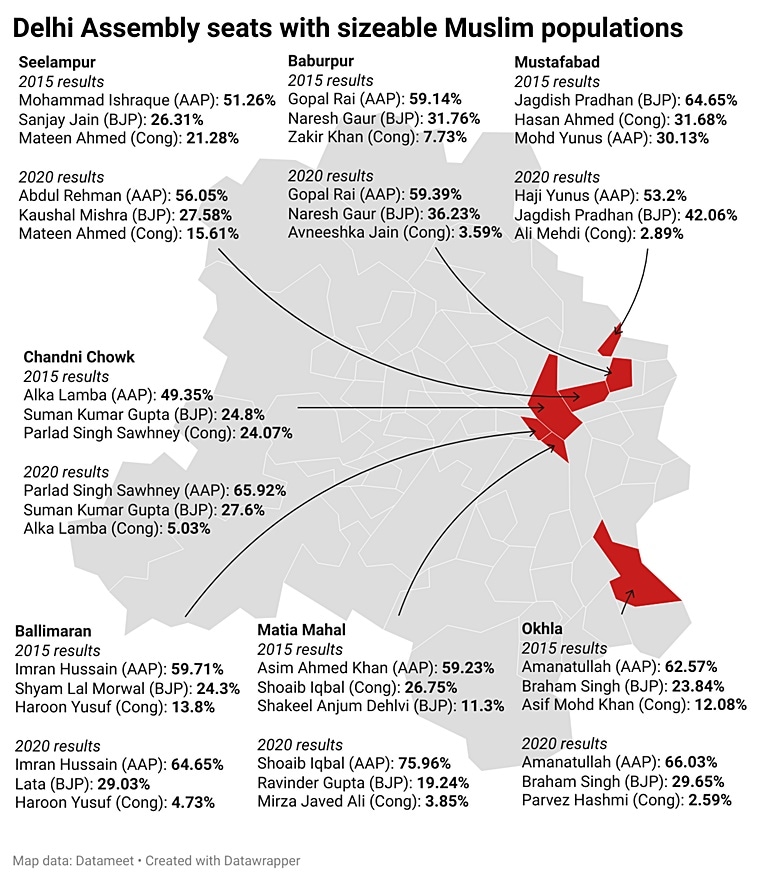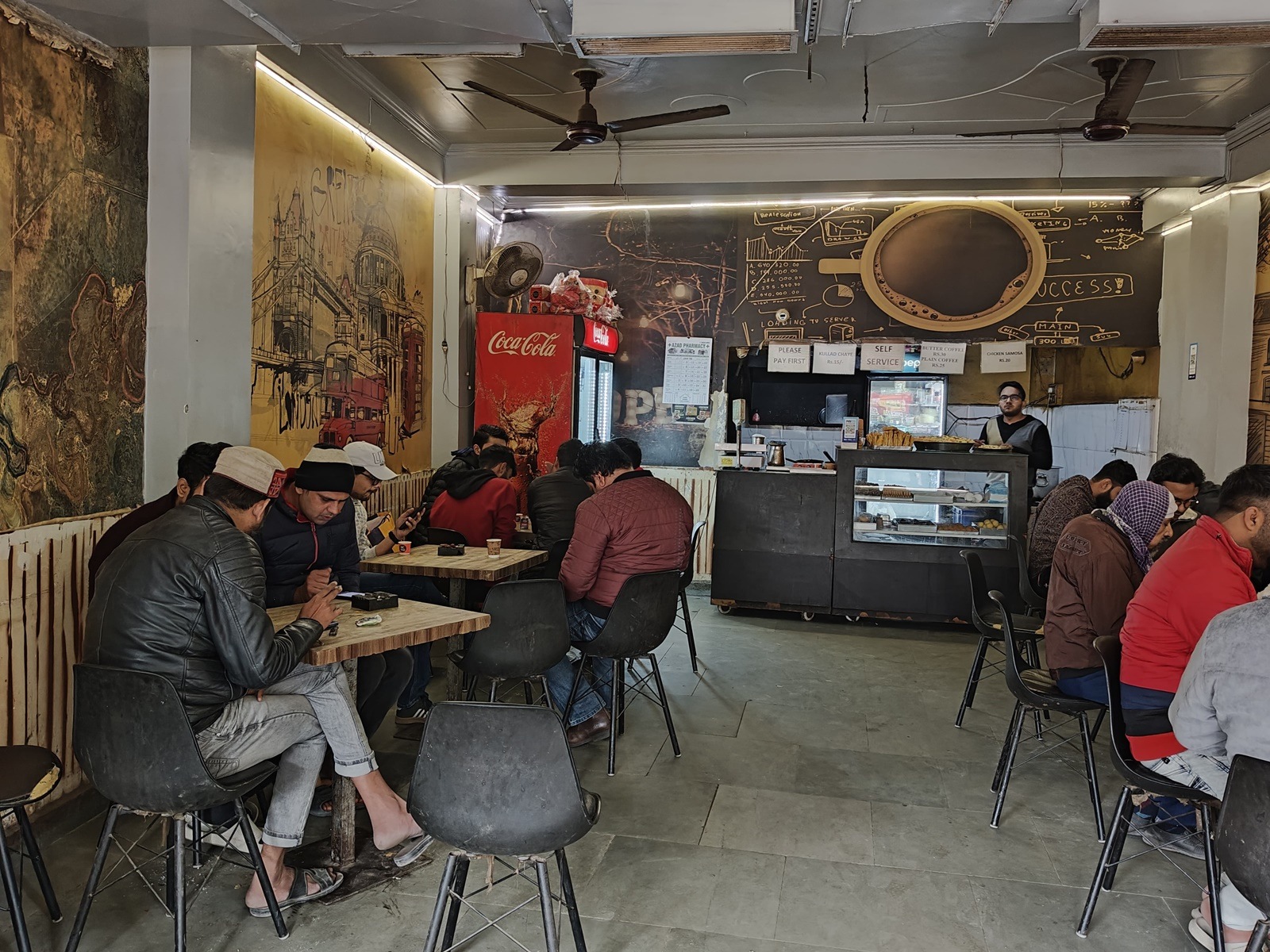The Al-Hind hospital in Northeast Delhi’s Mustafabad is almost empty. The hospital that served as the first responders for the injured in the 2020 riots is run by Dr Anwar (44).
Almost five years after the violence, locals say that while they are unhappy with how the “AAP government acted during and after the riots”, they have no choice but to vote for the party. For them and several other voters from the minority community in the National Capital, it is a classic case of Hobson’s choice: the appearance of various options but only one real possible course of action.
Sitting in an empty room of his hospital on a cold January morning, Dr Anwar explains that Muslims will vote for the AAP because of worry about the BJP forming the government in the coming elections.
“Yes, there was anger over the riots and how the AAP government remained mute spectators during that time. But that was then. Now, it is about survival, about roti, kapda, aur makaan (bread-and-butter issues). And to survive, the BJP must be kept out of power,” he says.
Of Delhi’s 70 constituencies, Muslims are a decisive factor in seven: Mustafabad, Chandni Chowk, Matia Mahal, Baburpur, Seelampur, Okhla, and Ballimaran. In 2020, the AAP comfortably won all seven constituencies. However, AAP leaders accept that the party’s margins may drop in these constituencies this time. “The support from the community may not be as whole-hearted as it was the last time but we are hopeful of winning all seven seats,” says a senior AAP leader. The BJP has not yet announced its candidates in these seven seats.

Mustafabad
In 2015, when the AAP swept the National Capital with 67 out of 70 seats, Mustafabad was one of the three constituencies that went to the BJP. Its candidate Jagdish Pradhan won from the seat with around 40% Muslim voterslargely on account of the anti-BJP vote splitting between the AAP’s Haji Yunus (30.13% vote share) and the Congress’s Hasan Ahmed (31.68%).
In 2020, the AAP won in Mustafabad, after the minorities rallied behind Yunus, giving him 53.2% of the votes. Pradhan was a distant second at 42.06%, with the Congress’s Ali Mehdi managing just 2.89% of the votes. The minority population is determined to keep the BJP out again.
However, the contest this time has been complicated by the entry of Asaduddin Owaisi’s AIMIM, which plans to contest 10 seats in the National Capital. From Mustafabad, the party has fielded former AAP councillor Tahir Hussain, who is among the accused in the Delhi riots case and spent some time in jail in connection with it. The Congress has repeated Mehdi and the AAP has fielded a new candidate, Adil Ahmad Khan.
Mohammad Faisal (41), who is a member of the neighbourhood Jama Masjid committee, says while the community will vote as one unit, some in Mustafabad may choose the AIMIM’s Hussain out of “sympathy”.
 The Arshi Dairy and Cafe in Okhla, which is popular with students of Jamia Milia Islamia. A widespread view in this area is that the Congress has not taken these elections “seriously” and thus is not a viable option. (Express Photo: Asad Rehman)
The Arshi Dairy and Cafe in Okhla, which is popular with students of Jamia Milia Islamia. A widespread view in this area is that the Congress has not taken these elections “seriously” and thus is not a viable option. (Express Photo: Asad Rehman)
Baburpur
In neighbouring Baburpur constituency, where Muslims comprise around 45% of the population, the AAP has repeated minister Gopal Rai while the Congress has fielded Mohammad Ishraque, the former AAP MLA from Seelampur. The local Congress cadre is unhappy, alleging Ishraque has been “parachuted” into the constituency. “The party always goes with big names and ignores those who have worked on the ground for years,” complains a local Congress leader.
Abid Kaleem (31), who runs a chicken shop in the busy Babarpur market, says he will vote for the AAP because of the government’s welfare schemes. “Last year, I had to pay electricity bills for only three months. For the other months, I had no electricity bills because of the subsidy. There was no hospital in the area earlier. Now the AAP has built a 50-bed hospital. Also, if the AAP is voted back, it won’t go after food stalls and meat shops.”
Sahil, a 31-year-old butcher at the shop, says, “It’s not like Kejriwal has fulfilled all his promises, but if he makes ahundred promises and fulfills even five, it’s enough. People have been saying the cash schemes might not be implemented, but even if they aren’t, it won’t change our support for him.”
Gopal Rai won Baburpur five years ago with a 59.39% vote share while the BJP’s Naresh Gaur came second with 36.23%. The Congress’s Anveeksha Jain came third with 3.59%.
Okhla
Around 10 km away, in the Okhla Assembly seat that is seen as the stronghold of AAP’s Amantullah Khan, the landscape changes but the narrative remains the same. People from the minority community comprise around 55% of the population here.
Social activist Syed Khalid Rashid, 44, who was among the organisers of the Shaheen Bagh protests in 2019, says, “Everyone knows that the AAP was at fault and has over the years taken the path of soft Hindutva. But what can we do? The sentiment in the area among Muslims is that this one seat won’t change the outcome of the elections in the city. Hence, we have one choice: vote for the AAP.”
At the Arshi Dairy and Cafe in Jauhari farm, which is popular with students from Jamia Millia Islamia, 21-year-old philosophy student Mahfuz Haq, who grew up in Shaheen Bagh, talks about the Congress’s failure to capitalise on Muslims’ unhappiness with the AAP.
The view that the Congress has not taken these elections “seriously” is quite widespread in the area. A Congress leader accepts that the party lacks a Muslim face. “We don’t have a Muslim face in the city. If a young party like the AAP can have someone like Amanatullah, why can’t the Congres? It is because the party wakes up just before elections and doesn’t work to build its cadre and leadership during non-election time,” says the leader.
In 2020, Amanatullah had recorded one of the biggest wins, getting 66.03% of the votes, while the BJP’s Braham Singh came second with a 29.65% vote share. The Congress’s Parvez Hashmi finished third with 2.59% of the votes.
Matia Mahal
Matia Mahal in Central Delhi — the Jama Masjid comes under it— also has a sizeable number of Muslim voters (60%). On a busy winter evening, kabab stall owner Ghufran Saghir praises the AAP, saying, “We used to face severe harassment for keeping our stalls open after 10 pm, but that has changed under Kejriwal. Sanitation has drastically improved and the best thing about Kejriwal is that he doesn’t look for ways to extort small vendors.”
At Saghir’s stall, local Rizwana Khan (47) who has three school-going children lauds the “transformation” of Delhi schools under Kejriwal. “My children attend government schools. They have completely changed under this government,” she says, adding that the Congress has little presence here.
In 2020, the AAP’s Shoaib Iqbal won Matia Mahal after polling 75.96% of the votes. The BJP’s Ravinder Gupta was a distant second with a 19.24% vote share and the Congress’s Mirza Javed Ali finished third with 3.85%.
Discover the Benefits of Our Subscription!
Stay informed with access to our award-winning journalism.
Avoid misinformation with trusted, accurate reporting.
Make smarter decisions with insights that matter.
Choose your subscription package

